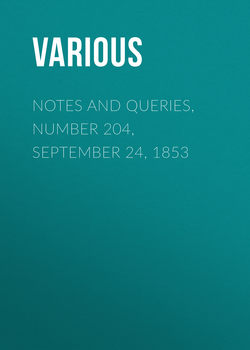Читать книгу Notes and Queries, Number 204, September 24, 1853 - Various - Страница 5
Notes
SHAKSPEARE CORRESPONDENCE
Оглавление"Priam's six-gated city," &c.—In the prologue to Troilus and Cressida occurs—
" . . . Priam's six-gated city,
Dardan and Tymbria, Ilias, Chetas, Trojan,
And Antenorides, with massy staples,
And corresponsive and fulfilling bolts."
What struck me here was the omission of the only gate of Troy really known to fame, the Scæan, which looked on the tomb of the founder Laomedon; before which stood Hector, "full and fixed," awaiting the fatal onslaught of Achilles; where Achilles, in turn, received his death-wound from the shaft of Paris; and through which, finally, the wooden horse was triumphantly conveyed into the doomed city.
The six names are shown to be taken by Shakspeare in part from Caxton, and in part from Lydgate: and in Knight's edition we are told that they are "pure inventions of the middle age of romance-writers."
Let us examine this assertion. The names are to be found pretty nearly as above, but with one important difference, in Dares' History of the Trojan War. My authority is Ruæus, the Delphine editor of Virgil (see his note at Æn. II. 612.). Now Dares (perhaps the oldest of the profane writers whom we know) was a Phrygian, who took part in the Trojan war, and wrote its history in Greek: and the Greek original was still extant in the time of Ælian, from A.D. 80 to 140. Of this, now lost, a Latin translation still survives, by some attributed to Cornelius Nepos, and by some regarded as spurious; but, either way, its date must be long antecedent to "the middle age of romance-writers." It was doubtless from this Latin history that Caxton or Lydgate, or both, derived directly or indirectly the names they adopted; and yet it is to be noted that they give respectively the names of Chetas and Cetheas to one of their gates, and omit the well-known Scæan, which Dares expressly mentions; for I presume that no principle of philology will sanction the identification of Scæan with either of the terms used by these two writers.
I have trespassed somewhat on your space, but let me hope the subject may be farther elucidated. The points I wish to put forward are, Shakspeare's omission of the Scæan gate, and the proposition by Knight (for a proposition it is, though in a participular form), that these six names are "pure inventions of the middle age of romance-writers."
W. T. M.
Hong Kong.
On the Word "delighted" in "Measure for Measure," &c. (Vol. viii., p. 241.).—Inasmuch as the controversy respecting this word seems to be over, and no one of the critics and commentators on Shakspeare's text appears to have the slightest clue to the real meaning and derivation, I will enlighten them. But, first, I must say, I am surprised that Dr. Kennedy should (though he has certainly hit on the right meaning) be unable to give a better account of the word than that in Vol. ii., pp. 139. 250. And as to the passage quoted (Vol. ii., p. 200) by Mr. Singer from Sidney's Arcadia, I beg to inform him that the word delight, which occurs therein, is a misprint for daylight!
We find, in the Latin, the substantive deliciæ, delight, pleasure, enjoyment; and the adjective (derived from the same root, and guiding us to the original meaning of the substantive) delicatus, which amongst other meanings, has that of tender, soft, gentle, delicate, dainty.
As the early English scholars were not very particular about the form of the words they introduced from the Latin, or indeed of those which were purely English, for they changed them at their pleasure,—and that this is the case, I presume no one at all versed in the literature of the time of Henry VIII. will dispute,—it requires no great exertion of fancy to believe, that, finding the substantive deliciæ Englished delight, they rendered the adjective delicatus delighted. The fact that they did use the words delight and delicate as synonymous, is proved by a passage in "a boke named the Gouernour deuised by Syr Thomas Elyot, Knyght, Londini, 1557;" in which, at folio 203., p. 1., we find Titus, the son of Vespasian, who was ordinarily termed "the delight of mankind," called "the delicate of the world."
We are therefore to conclude that the words delicate and delighted were used indifferently by writers of the age of Shakspeare, as well as by those previous to him, to express the same thing; and that by the phrase "delighted spirit" in Measure for Measure, "delighted beauty" in Othello, "delighted gifts" in Cymbeline, we are to understand, exquisitely tender, delicate, or precious.
I cannot agree with Dr. Kennedy that deliciæ, delicatus come from deligere rather than delicere; since, if my memory does not deceive me, the former is as often, if not oftener, used by good writers to express to drive away, to upset, to remove from, or detach—as to select or choose—which is the only meaning the word has akin to deliciæ; whereas delicere is actually used by one of the earlier Latin poets for to delight.
The word dainty, I may inform Dr. Kennedy, is from the obsolete French dein or dain, delicate; which probably came from the still older Teut. deinin, minuta (vid. Schilter).
H. C. K.
—– Rectory, Hereford.
